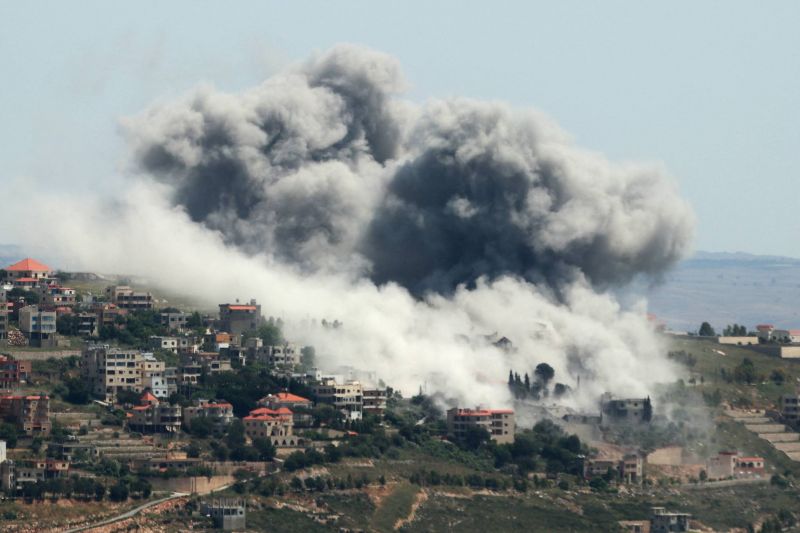
Smoke billows from the site of an Israeli airstrike on the southern Lebanese village of Khiam near the border on May 8, 2024 amid ongoing cross-border tensions as fighting continues between Israel and Palestinian Hamas militants in the Gaza Strip. (Credit" Rabih Daher/AFP)
Want to get the Morning Brief by email? Click here to sign up.
Catch up on yesterday’s LIVE coverage of Day 215 the Gaza war here.
Israeli bombardment on South Lebanon killed five Hezbollah and Palestinian Islamic Jihad fighters, a security source told L’Orient Today’s correspondent in the region. The three fighters were killed in an airstrike on Khiam while another attack on Adaisseh killed the two Hezbollah members and injured two other people. The deadly strikes numbered among numerous Israeli strikes on homes across the region while Hezbollah continued to announce cross-border attacks on Israeli military positions.
Material damages to buildings and infrastructure caused by Israeli bombardments since Oct. 8 have surpassed $1.5 billion, according to the Southern Council’s ground assessment and consultations, with 1,700 buildings destroyed and 14,000 damaged, AFP reported. Roads and water, electricity and health services infrastructure have suffered $500 million in damages, council chief Hashem Haidar said yesterday. The damages and destruction to residential buildings, meanwhile, means that many of the over 90,000 people displaced from the region will not have homes to return to. BlomInvest’s Purchasing Managers’ Index for April, meanwhile, hit a four-month low – gauging further deterioration to business activity as proxied by private businesses’ new orders, output, employment, suppliers’ delivery time and stocks of purchases – driven by reduced sales and demand due to the war and regional instability. Caretaker Prime Minister Najib Mikati in March denied press rumors of a $46 million compensation plan, which allegedly allotted $40,000 per destroyed residential unit – while the Lebanese Forces said such payments should be expensed to Hezbollah, at the forefront of the clashes with Israel. Hezbollah, during a weeklong reprieve in fighting concomitant with a truce in Gaza, said it began surveying damages and dispensing payments to affected families. Israel’s attacks on the region have also had an economic toll by devastating southern Lebanon’s agriculture – which provides 80 percent of its GDP, by the UNDP’s estimate. Mikati last month publicized government estimates, amounting to an “agricultural disaster,” inflicted by Israeli projectiles which had scorched 800 hectares, killed 34,000 heads of livestock and deprived three-quarters of the region’s farmers from their last source of income. Lebanese think tank the Policy Initiative in February estimated that Israeli strikes, in addition to their direct material costs, cost Lebanon hundreds of millions of dollars by interrupting exports from crops primarily grown in southern Lebanon, turning away visitors to Lebanon and stifling foreign investment.
Private Hospital Syndicate chief Sleiman Haroun claimed public insurers would need to increase payments between 30 to 100 percent to match healthcare establishments’ expenses facing salary and tax hikes as well as rising electricity and equipment costs. The estimate results from a study by hospitals on the tariffs needed to avoid payment delays and cover their costs, Haroun said, urging the government to enable hospitals to renegotiate higher rates with public insurers. Beneficiaries of public insurance schemes, such as the National Social Security Fund (NSSF), told L’Orient Today they were in dire straits attempting to cover their treatments themselves as their dues rose from 10-15 percent to nearly 70 percent, by Haroun’s estimate. Payment issues between the NSSF and private hospitals have previously threatened continued access to care for beneficiaries.
At least 34,844 people have been killed in Gaza since Oct. 7, according to the latest figures from the enclave’s Health Ministry. Weeks after approving more billions in military aid to Israel, US suspended a bomb shipment over Israeli adamance to invade Rafah despite international contraindication – an attack which Israeli officials previously said they are intent on with or without international backing. After Hamas announced its approval for truce conditions negotiated in Cairo, rejected by Israel, diplomatic efforts continued attempting to breach the gap with an Israeli delegation in Egypt and the US intelligence chief in Israel. Israel reopened the Kerem Shalom crossing, which had been closed since a Hamas attack Sunday, followed by intensified Israeli bombardments on Rafah and orders to evacuate the southernmost city – sheltering more than 1 million displaced Palestinians. The closure sparked international concern over aid flows to Gaza, already entering at vastly insufficient levels by international organizations’ estimates, which as of yesterday threatened to deplete fuel reserves from the few hospitals remaining. Israel’s restrictions aid entries have Gazans threatened with starvation while the healthcare system reels facing shortages and damage from direct Israeli attacks. A third mass grave left in the wake of Israel’s attack on Gaza’s al-Shifa Hospital was uncovered yesterday, Al-Jazeera reported
In case you missed it, here’s our must-read story from yesterday: “'Do I laugh or cry?': Gazans react to Rafah offensive and ceasefire doubts”
Compiled by Abbas Mahfouz
